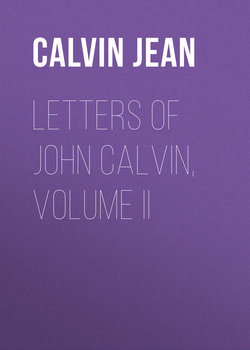Читать книгу Letters of John Calvin, Volume II - Calvin Jean, Jean Calvin - Страница 24
CLXVII. – To Farel. 68
ОглавлениеExcitement caused at Geneva by the Representation of a Play
Geneva, 4th July 1546.
Our plays narrowly escaped being converted into tragedy. When the senate had asked my opinion, I said that I would make no reply unless concerning the common resolution of the brethren. The brethren having been heard, I replied, that for many reasons it did not seem to us expedient that the games should be proceeded with, and at the same time I explained the grounds of our opinion. I said, however, that we did not wish to oppose them, if the senate held out for them. When the day was coming on, Michael, (who had done so once before,) instead of preaching, inveighed against the actors; but so vehement was this second invective, that a concourse of people straightway made towards me with loud shouts, threats, and what not. And had I not by a strong effort restrained the fury of some of them, they would have come to blows. I endeavoured in the second discourse to appease their exasperation, observing moderation, for I judged that he had acted imprudently in having at an unseasonable time chosen such a theme for declamation. But his extravagance was the more displeasing, since I could by no means approve of what he had said. He maintained it to be true; I firmly denied it. There were some of the brethren who encouraged the man in his obstinacy. About nine in the evening, I was told that a hundred or thereabouts would meet on the following day in the council-room. I immediately called the brethren together: we came to the resolution that we ought to accompany Michael. He was hardly suffered to go out along with me. I bring him to the place of meeting; meanwhile I order the others to be sent for. His accusers indicate their refusal to speak while we are present; for they said they had no concern with me, beyond that they regarded me with reverence, and were therefore unwilling to enter into any dispute with me. I strenuously insist that the cause is common, until it appear that Michael has erred in his duty. We are ordered to withdraw to separate sides of the house; from the opposite party arise seditious shouts; they threateningly assert that they would have killed Michael were it not that they revered me. To restrain the tumult, he was detained in the council-room, but in a respectful manner. On the following day, by the favour of the Lord, we quieted all disturbances; for Abel,69 by the esteem in which he is held, and I by my authority, prevailed with the actors. The senate, however, was on our side. I was so far displeased with it, that it was not more courageous and spirited, for as usual it behaved too timidly; the result is, that the games are now going on. Viret is present as a spectator, who has again returned, according to arrangement, with a view to restore our furious friend to sanity.70
Of your brothers I hear absolutely nothing. There is with you one Elie Limousin by name, a native of Rochelle, who has now in a third letter asked me to certify to you what I have known of his former life. Pious people who come from that district declare that he was an upright man, and of honourable life, and also that he was unmarried when he removed thence to us. There is no reason, therefore, why any suspicion of this nature should be a hindrance to his marriage. You will apologize for my not having replied to him, and also for having so cursorily gone over to you what perhaps demanded a longer discourse. Adieu, dearest brother in the Lord, and most sincere friend. Salute respectfully all the brethren; there is no salutation from any one here to you or them, as no one knew I was going to write except Nicolas, the father-in-law of a brother, who came in. May the Lord be ever present with you, and bless your sacred labours.
[Calvin's Lat. Corresp. Opera, tom. ix. p. 43.]
69
The minister, Abel Poupin, exerted his interest with the actors to appease the tumult excited by his colleague.
70
It is seen by this instance, that Calvin was not so stern as to proscribe public games and amusements that harmonized with decency. "He himself made no scruple in engaging in play with the seigneurs of Geneva; but that was the innocent game of the key, which consists in being able to push the keys the nearest possible to the edge of a table." – Morus, quoted Hist. de la Suisse, vol. xi. p. 356.
